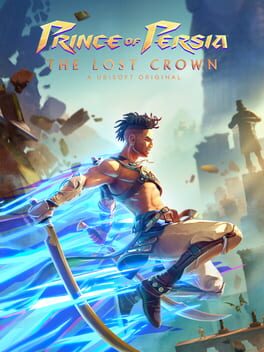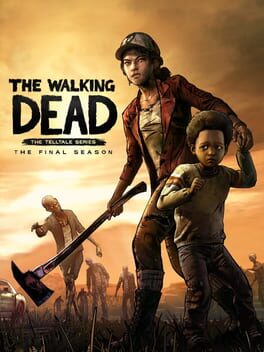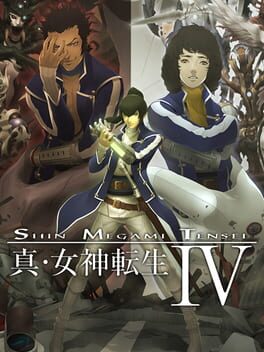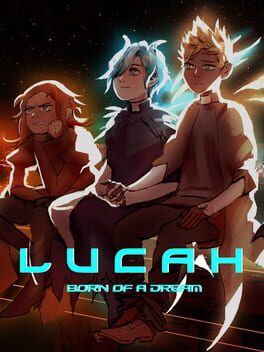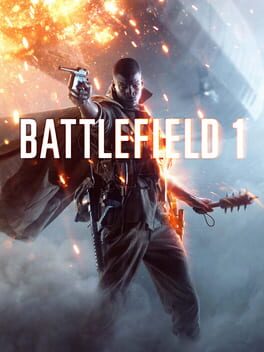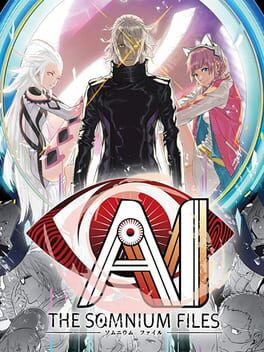whymeo
2016
SeaBed made me cry for like 20 minutes straight while trying to read it through tears. I've never really read anything else quite like it, and it seems to me that it's truly a shame that it isn't widely regarded as one of the best visual novels out there. Sure, part of what makes it so unique – the extremely slow pace, and a story that is mostly interested in looking at its characters through everyday conversations and the mundane details of their lives – is somewhat off-putting to a lot of people; so it probably makes sense that it's not that well known.
However, by the end of the game I personally felt like there was hardly a wasted moment in it despite how slow and relatively light on plot it is. All the time spent on characterization and building up the central mystery of the game was, to me at least, absolutely essential for the story of SeaBed to be so affecting and end so strongly. It really is a beautifully constructed visual novel, that's well worth reading even if its narrative structure is different from anything else you've ever read.
However, by the end of the game I personally felt like there was hardly a wasted moment in it despite how slow and relatively light on plot it is. All the time spent on characterization and building up the central mystery of the game was, to me at least, absolutely essential for the story of SeaBed to be so affecting and end so strongly. It really is a beautifully constructed visual novel, that's well worth reading even if its narrative structure is different from anything else you've ever read.
2022
The way in which both Butterfly Soup 1 and 2 switch back and forth so easily between some really funny shit, that had me laughing to a degree that video games almost never manage to make me laugh, to deeply heartfelt and thoughtful writing has got to be unparalleled. Games like these two make me wish I was better at getting through my backlog, instead of not playing a game like Butterfly Soup until five years later when a sequel is released. I truly could not say enough positive things about them both to fully articulate how happy the simple act of playing them made me. Just fantastic.
Also, I hope Diya is still just as enamored with the Home Depot lights section if there's ever a Butterfly Soup 3.
Also, I hope Diya is still just as enamored with the Home Depot lights section if there's ever a Butterfly Soup 3.
I probably would have hated TLOU 2's story if I hadn't gone into it already knowing the plot – its nihilism and grim outlook on the nature of people would have been exhausting otherwise – but since I knew what it was going to be like going into it, I was able to enjoy the story a fair bit. It still has a lot of problems of course: its themes are not very deep or interesting despite the writers clearly thinking that they are, the idea that a violent and depressing story = an intelligent and mature story permeates the whole thing and is just tiring, and character's motivations don't always make a ton of sense. But, its characters are mostly likable and there's some good moments between them. And the gameplay is fun and the visuals are quite nice too look at. So, all in all it's an enjoyable game in my opinion – despite being deeply flawed.
This review contains spoilers
This year, after finishing Elden Ring, I was looking for a game to sink some time into and as a result of that a friend ended up gifting me the collection of all the seasons of Telltale's The Walking Dead on Steam. He asked if he could watch me play some of the game now and then through me streaming it to him in a discord call, and to make sure I played the last two episodes of the final season when he was there. He also made it clear early on that the only season he thought highly of was the final season, and everything else was just varying degrees of good, but even so after finishing the third season I found myself worried that he was going to end up disappointed by me thinking that the final season was good – but nothing special.
I just really had my doubts that the first three seasons were going to lead to something fantastic in the end; the first season absolutely aged like milk with a lot of boring dialogue and a largely uninteresting plot (for example: in 2022, a family in a video game apocalypse setting turning out to secretly be cannibals just makes you roll your eyes). The next two seasons, although better written, were still nothing particularly impressive. I left the first two seasons feeling like the only things the writers had really accomplished were making me care about Clem from the first season onward (and making you care about a little kid in an apocalyptic setting isn't exactly a feat of literary genius) and making Kenny kind of an interesting character as a man with a patriarchal mindset who failed over and over to learn the lesson that he couldn't protect the ones he loved by himself and needed to rely on others to help him do so. There was also other somewhat interesting characters, and good moments here and there, but nothing that was going to stick with me except the very end of season 1 – which was, once again, largely relying on the fact that it's very easy to make you care about a little kid undergoing horrible tragedy. And the third season worked well enough as a semi-standalone story in the setting, but I felt like it didn't really do the work that was necessary to make you really care about its characters and was, same as the prior two seasons, simply fine and enjoyable as a way to kill some time.
So, I went into the final season expecting at the end to be somewhat apologetic towards my friend for not liking the series nearly as much as him. Instead, he ended up listening to me cry throughout all of the scene where Clem is dying in the barn – and be deeply invested in the story from start to finish.
In retrospect, it kind of makes sense that they were able to stick the landing. The one thing all the other seasons had done really well was making Clem a likable character and making you care about her. So, it's not exactly surprising that the second season where you play as her, that is also the end to her story, ended up working well. Seeing Clem grow up over the seasons and go from a sweet child who struggled to see anyone get hurt in the first season, to a straightforward and competent young woman who is willing to do what is necessary to protect herself and those around in the last season was very satisfying. Even more so because, despite everything, she retained a lot of empathy for others – even complete strangers – and a sense of humor, both of which regularly show through despite her somewhat matter-of-fact personality and practical worldview. Still, Clem being a great character and getting to see the end of her story wouldn't be enough by itself to make the final season great, if the rest of the story and characters weren't particularly interesting. Thankfully, the final season improved those aspects significantly compared to the other seasons.
A lot of the season revolves around AJ and who he's becoming as he grows up, as a kid that has only known a world where simply not dying is a regular struggle. Playing as Clem, the game once again makes you feel responsible for raising a kid the same as you did back in season 1. And although it's obviously all smoke and mirrors (since really how much the story of a game like this can branch based on your decisions is very limited), the final season still did a great job at making me worry about how the decisions I was making were potentially effecting AJ. The game presents a lot of scenarios where committing violence seems like the obvious answer, but AJ is right there and he's already clearly way too comfortable with hurting people if he can justify it to himself – making each of those decisions, for me, really difficult as I tried to balance doing what seemed like the right call and trying to keep AJ from learning the wrong lessons and hurting more people. This is essentially the final season doing again what the first season did in Lee being responsible for Clem, but now with some added layers of complexity to it. And that, combined with the game doing a really good at keeping Clem a very likable character and making me want to see her have a happy ending, was already enough to make me way more invested in the final season than any of the others. But, there was even more that the final season does right.
The majority of the season takes place in and around Ericson, a school for “troubled youth”, many of whose former students still live there today after being abandoned by their teachers when the apocalypse started. These former students make up most of the cast of the season along with Clem and AJ, and the story is ultimately one of Clem and AJ finding their place among them – a kind of found family story. This leads directly into another great aspect of the final season, in which someone on the dev team made the very smart decision to think to themselves: “if we're going to be telling a story about a bunch of kids, who had rough childhoods and grew up fending for themselves, building a found family – there should be multiple queer kids in this”. It probably goes without saying why a story about kids who were let down by the adults around them and needed to learn to rely on each other is a natural fit for including some queer characters. Plus, the writers deciding to have Clem be bi is a welcome addition to her character, and if her and Violet (one of the students, who is a good portrayal of a kind of awkward teen who's trying her best and a great character in her own right. I mean, she's a lesbian who kills zombies with a meat cleaver who is desperately trying to keep herself emotionally separated from others in an attempt to try and avoid getting hurt when she loses people she cares about again, but below the performative detached nature is a deeply earnest and well-meaning person. How could anyone not like a messy character like that?) end up together the scenes between the two of them are surprisingly good. It's just some cute, awkward teen romance that I found very sweet and never failed to put a smile on my face. It was nice to see Clem in a very commonplace situation rather than just the usual fighting to survive, and it was a pleasant surprise as I had no clue that queer romance was part of the story going into it.
On top of those two aspects of the story, that mostly revolve around just a few characters, the final season does a great job with making all of its characters interesting. Pretty much all the kids of Ericson who you are supposed to root for are sympathetic characters, and I was way more invested in the cast as a whole than previous seasons. Also, even the characters that are kind of shitty people succeed at not being one-dimensional antagonists (unlike, for example, Carver). Marlon is somewhat sympathetic as a kid who is clearly in way over his head. The game makes an effort to link the person Lilly has become to growing up with a controlling asshole for a father (and, if you don't kill her and pick the right dialogue choices as she drifts away down the river, it's clear she's not 100% happy with the person she's become either). And the things that Minerva end up doing throughout the story just feel like a tragedy. And lastly, on top of all that good character writing, the final season absolutely nails the ending.
While is true that the game faking out Clem's “death” is controversial, to me that scene played into the themes of the final season well. The final season, as a found family story set in the apocalypse, obviously rejects the idea that uncaring individualism is a good way to survive crisis. Sure, it's not exactly a particularly deep or controversial message that helping and relying on others is good – but for what is ultimately a fairly happy ending to the series, it's a fine theme to include. And AJ refusing to do the smart thing and listen to Clem when she tells him to accept that she's dying and to leave her, plays into that theme; Clem surviving because of what AJ did is the final touch that really brings together a great story. And, on top of that, it's a nice way to wrap up AJ's story as well. Whatever bad decisions he made throughout your playthrough to hurt or even kill other people, in the end him saving Clem is a reminder that she taught him how to survive and he is just as capable of using those lessons to help people as he is of using them to hurt others. He's still just a kid, and although his willingness to commit violence is troubling, he still has the potential to grow up to be a good person. After the season was so effective at making me worry about who AJ was becoming, it was really nice for his character arc to end on that note. Would it have been better to have all this without faking Clem's death? Maybe, but nothing is perfect. Besides, it serves as a very good emotional rollercoaster.
And then, the story ends with Clem and AJ, happy with their new home and the people they've surrounded themselves with. Not without troubles or worries, but content in the moment. And that's about as happy of an ending as I could have asked for for Clem, and makes all of what came before the final season more than worth it.
I just really had my doubts that the first three seasons were going to lead to something fantastic in the end; the first season absolutely aged like milk with a lot of boring dialogue and a largely uninteresting plot (for example: in 2022, a family in a video game apocalypse setting turning out to secretly be cannibals just makes you roll your eyes). The next two seasons, although better written, were still nothing particularly impressive. I left the first two seasons feeling like the only things the writers had really accomplished were making me care about Clem from the first season onward (and making you care about a little kid in an apocalyptic setting isn't exactly a feat of literary genius) and making Kenny kind of an interesting character as a man with a patriarchal mindset who failed over and over to learn the lesson that he couldn't protect the ones he loved by himself and needed to rely on others to help him do so. There was also other somewhat interesting characters, and good moments here and there, but nothing that was going to stick with me except the very end of season 1 – which was, once again, largely relying on the fact that it's very easy to make you care about a little kid undergoing horrible tragedy. And the third season worked well enough as a semi-standalone story in the setting, but I felt like it didn't really do the work that was necessary to make you really care about its characters and was, same as the prior two seasons, simply fine and enjoyable as a way to kill some time.
So, I went into the final season expecting at the end to be somewhat apologetic towards my friend for not liking the series nearly as much as him. Instead, he ended up listening to me cry throughout all of the scene where Clem is dying in the barn – and be deeply invested in the story from start to finish.
In retrospect, it kind of makes sense that they were able to stick the landing. The one thing all the other seasons had done really well was making Clem a likable character and making you care about her. So, it's not exactly surprising that the second season where you play as her, that is also the end to her story, ended up working well. Seeing Clem grow up over the seasons and go from a sweet child who struggled to see anyone get hurt in the first season, to a straightforward and competent young woman who is willing to do what is necessary to protect herself and those around in the last season was very satisfying. Even more so because, despite everything, she retained a lot of empathy for others – even complete strangers – and a sense of humor, both of which regularly show through despite her somewhat matter-of-fact personality and practical worldview. Still, Clem being a great character and getting to see the end of her story wouldn't be enough by itself to make the final season great, if the rest of the story and characters weren't particularly interesting. Thankfully, the final season improved those aspects significantly compared to the other seasons.
A lot of the season revolves around AJ and who he's becoming as he grows up, as a kid that has only known a world where simply not dying is a regular struggle. Playing as Clem, the game once again makes you feel responsible for raising a kid the same as you did back in season 1. And although it's obviously all smoke and mirrors (since really how much the story of a game like this can branch based on your decisions is very limited), the final season still did a great job at making me worry about how the decisions I was making were potentially effecting AJ. The game presents a lot of scenarios where committing violence seems like the obvious answer, but AJ is right there and he's already clearly way too comfortable with hurting people if he can justify it to himself – making each of those decisions, for me, really difficult as I tried to balance doing what seemed like the right call and trying to keep AJ from learning the wrong lessons and hurting more people. This is essentially the final season doing again what the first season did in Lee being responsible for Clem, but now with some added layers of complexity to it. And that, combined with the game doing a really good at keeping Clem a very likable character and making me want to see her have a happy ending, was already enough to make me way more invested in the final season than any of the others. But, there was even more that the final season does right.
The majority of the season takes place in and around Ericson, a school for “troubled youth”, many of whose former students still live there today after being abandoned by their teachers when the apocalypse started. These former students make up most of the cast of the season along with Clem and AJ, and the story is ultimately one of Clem and AJ finding their place among them – a kind of found family story. This leads directly into another great aspect of the final season, in which someone on the dev team made the very smart decision to think to themselves: “if we're going to be telling a story about a bunch of kids, who had rough childhoods and grew up fending for themselves, building a found family – there should be multiple queer kids in this”. It probably goes without saying why a story about kids who were let down by the adults around them and needed to learn to rely on each other is a natural fit for including some queer characters. Plus, the writers deciding to have Clem be bi is a welcome addition to her character, and if her and Violet (one of the students, who is a good portrayal of a kind of awkward teen who's trying her best and a great character in her own right. I mean, she's a lesbian who kills zombies with a meat cleaver who is desperately trying to keep herself emotionally separated from others in an attempt to try and avoid getting hurt when she loses people she cares about again, but below the performative detached nature is a deeply earnest and well-meaning person. How could anyone not like a messy character like that?) end up together the scenes between the two of them are surprisingly good. It's just some cute, awkward teen romance that I found very sweet and never failed to put a smile on my face. It was nice to see Clem in a very commonplace situation rather than just the usual fighting to survive, and it was a pleasant surprise as I had no clue that queer romance was part of the story going into it.
On top of those two aspects of the story, that mostly revolve around just a few characters, the final season does a great job with making all of its characters interesting. Pretty much all the kids of Ericson who you are supposed to root for are sympathetic characters, and I was way more invested in the cast as a whole than previous seasons. Also, even the characters that are kind of shitty people succeed at not being one-dimensional antagonists (unlike, for example, Carver). Marlon is somewhat sympathetic as a kid who is clearly in way over his head. The game makes an effort to link the person Lilly has become to growing up with a controlling asshole for a father (and, if you don't kill her and pick the right dialogue choices as she drifts away down the river, it's clear she's not 100% happy with the person she's become either). And the things that Minerva end up doing throughout the story just feel like a tragedy. And lastly, on top of all that good character writing, the final season absolutely nails the ending.
While is true that the game faking out Clem's “death” is controversial, to me that scene played into the themes of the final season well. The final season, as a found family story set in the apocalypse, obviously rejects the idea that uncaring individualism is a good way to survive crisis. Sure, it's not exactly a particularly deep or controversial message that helping and relying on others is good – but for what is ultimately a fairly happy ending to the series, it's a fine theme to include. And AJ refusing to do the smart thing and listen to Clem when she tells him to accept that she's dying and to leave her, plays into that theme; Clem surviving because of what AJ did is the final touch that really brings together a great story. And, on top of that, it's a nice way to wrap up AJ's story as well. Whatever bad decisions he made throughout your playthrough to hurt or even kill other people, in the end him saving Clem is a reminder that she taught him how to survive and he is just as capable of using those lessons to help people as he is of using them to hurt others. He's still just a kid, and although his willingness to commit violence is troubling, he still has the potential to grow up to be a good person. After the season was so effective at making me worry about who AJ was becoming, it was really nice for his character arc to end on that note. Would it have been better to have all this without faking Clem's death? Maybe, but nothing is perfect. Besides, it serves as a very good emotional rollercoaster.
And then, the story ends with Clem and AJ, happy with their new home and the people they've surrounded themselves with. Not without troubles or worries, but content in the moment. And that's about as happy of an ending as I could have asked for for Clem, and makes all of what came before the final season more than worth it.
SMT fans will tell you that this one has the best writing of the mainline games, but when I started Apocalypse I had the thought: “oh, there was some writing describing what a character did while they talked, that almost never happened in IV” – immediately followed by the realization that IV failed to clear a bar that all but the most incompetently written books would easily pass. This probably had something to do with why I found IV's story kind of boring; it turns out that writing a visual novel and having it be 99% dialogue makes for rather dry reading.
The gameplay is fairly fun though, if a bit dated in some annoying ways here and there.
The gameplay is fairly fun though, if a bit dated in some annoying ways here and there.
Put in simplest terms, Lucah: Born of a Dream is an action RPG in which you'll find fast paced combat akin to Hyper Light Drifter and design decisions that take a lot of inspiration from soulslikes; the game's world is full of bonfire equivalents scattered across its levels that respawn enemies and refill your limited health resource whenever you rest at one. However, what makes Lucah interesting is not the similarities it shares with other games, but in how it differs. While a very mechanically tight and satisfying to play game, it is also very willing to make decisions that are simply uncommon to see in video games. It's this willingness to make surprising decisions where its greatest strengths lie, and the first one of these decisions that you'll notice is the art.
Although Lucah's art is comprised of pixel art (as one would expect from a small indie game), it rejects having a clean pixel art aesthetic designed to get people who've played dozens of similarly clean looking indie games interested in it. Instead, it is often sharp, jagged, and sometimes even monotonous to look at. Many of the games areas are comprised of rough white shapes that occasionally only loosely represent the environments they're supposed to convey, all plastered over a pure black background. In some of the more empty looking areas of the game, the art can blend into itself from room to room, and can create the feeling of making no progress at all – contributing to an uneasy atmosphere that the game's eerie music and the strange red beasts known as nightmares that you encounter throughout help create.
That's not to say that Lucah isn't a great looking game. When it chooses to be it can be quite visually striking, and it often does choose to; in fact it's one of the best looking games I've ever played in my opinion. From the way the bright red nightmares stain the black and white environments they roam, to gorgeous skylines created out of a simple gradient and a few sketches of clouds, Lucah is regularly beautiful to look at. But there's definitely a willingness to forgo making something with a marketable art style in favor of creating an uneasy and somewhat lifeless tone that follows you throughout the game. And it is a fantastic decision that pairs well with the game's bleak story.
The story, same as the art, resists being simple and straightforward. Although there's recurring characters throughout, and one can glean with a decent amount of certainty a few bits of their stories here and there, the game mostly exists in the realm of metaphors and repeating themes. It is fairly safe to say that the game is partially about queer kids who have suffered deeply from growing up under some stifling and unaccepting christian religion, and suicidal thoughts come up with some regularity as the final expression of the guilt that growing up being told that your very nature is wrong instills in a person. Beyond those themes though, the game is mostly left open for interpretation – in a way that is both deeply interesting and often adds to the upsetting nature of what the story is about.
It is even unclear whether the events that take place in the game are meant to be taken as the reality of what is happening to its characters, or simply a fantastical retelling of their lives. The game deploys this dreamlike quality of its story well though, giving you just enough of a picture of what has happened to its characters to encourage you to interpret what is left up to the imagination. This vague story is often portrayed through bold white text on top of the same black background that serves as the backdrop of the game, the raw emotion of its characters shown clearly but divorced from explicit details of what is going on, with occasional flashes of art that is (often abstract) depictions of what is happening. All of this combined to make a story that I found hard to get out of my head even when not playing the game, and a sense of mystery about what was taking place in it that made the rare moments when the game peels back the curtain just enough to give you a more concrete idea of what has caused all the pain its characters feel hit hard.
In its gameplay mechanics is where Lucah most feels like it is playing it safe and building its ideas off of other games. As you explore the world you'll go from one of the games bonfire equivalents to another where you can save, level up, and in true dark souls fashion both refresh the limited uses of your health resource and respawn all the non-boss enemies in the game. Adding to the tension as you try to make your way to the next bonfire to regain your health, is regular and often unavoidable combat.
Combat in Lucah consists of a mix of melee and ranged abilities. The ranged abilities available in the game that can be used without entering an attack animation that leaves you vulnerable cost a resource called charge, which you gain by hitting enemies with regular melee attacks. Meanwhile, regular melee attacks cost stamina, which you regain over time when not executing moves that cost stamina (performing regular attacks, dodging and running). In combination these two mechanics give the game's combat a rhythm of running in to hit enemies and then, once you're low on stamina, focusing on defense and pelting enemies from whatever distance you can maintain between you and them with ranged abilities while your stamina builds back up. It's quite a lot of fun to try and maintain the two resources of stamina and charge and keep up the flow of combat. That said, the combat might be at its most fun when your game plan all falls apart in a fight and the rhythm is totally lost: when you find yourself stuck desperately trying to avoid enemy attacks until you can execute a perfect dodge that leaves an enemy vulnerable or perform a parry that stops an enemy in its track – thus resetting the momentum of combat and allowing you to regain the rhythm of managing stamina and charge. That feeling of getting back on track is perhaps even more satisfying than perfectly getting through a combat encounter.
As you near the end of the story, which you'll need to play a much harder version of the game in new game+ to see all of, you'll find that the difficulty of the game's combat vastly increases and it can become a bit of a frustrating endurance test. And it's at this point in a new game+ playthrough that even in its gameplay Lucah begins to slightly strain against the norms of game design. Difficulty spikes leading to frustration are nothing rare in games, but Lucah's efforts to frustrate you begin to feel almost like an intentional dare. It's as if the game is asking you if you're willing to grind resources and struggle through increasingly hard fights with enemies that soak up a lot of damage – all because it wants you to earn beating the game, so that when it congratulates you for doing so and offers a reward through the fantastic end to its story, its praise won't feel hollow.
If Lucah really is trying to deliberately frustrate in its last couple of hours, is it a good choice? Much like the rest of its somewhat uncommon decisions, I'd say yes. The strange world depicted so uniquely through its art, the vague and compelling story that slowly builds throughout the game, and its fantastic combat – all these elements make a game well worth playing. And when, finally, Lucah challenges you to struggle to complete it if you can, those same elements make a game well worth seeing through to the end and the difficulty in doing so satisfying once overcome.
Although Lucah's art is comprised of pixel art (as one would expect from a small indie game), it rejects having a clean pixel art aesthetic designed to get people who've played dozens of similarly clean looking indie games interested in it. Instead, it is often sharp, jagged, and sometimes even monotonous to look at. Many of the games areas are comprised of rough white shapes that occasionally only loosely represent the environments they're supposed to convey, all plastered over a pure black background. In some of the more empty looking areas of the game, the art can blend into itself from room to room, and can create the feeling of making no progress at all – contributing to an uneasy atmosphere that the game's eerie music and the strange red beasts known as nightmares that you encounter throughout help create.
That's not to say that Lucah isn't a great looking game. When it chooses to be it can be quite visually striking, and it often does choose to; in fact it's one of the best looking games I've ever played in my opinion. From the way the bright red nightmares stain the black and white environments they roam, to gorgeous skylines created out of a simple gradient and a few sketches of clouds, Lucah is regularly beautiful to look at. But there's definitely a willingness to forgo making something with a marketable art style in favor of creating an uneasy and somewhat lifeless tone that follows you throughout the game. And it is a fantastic decision that pairs well with the game's bleak story.
The story, same as the art, resists being simple and straightforward. Although there's recurring characters throughout, and one can glean with a decent amount of certainty a few bits of their stories here and there, the game mostly exists in the realm of metaphors and repeating themes. It is fairly safe to say that the game is partially about queer kids who have suffered deeply from growing up under some stifling and unaccepting christian religion, and suicidal thoughts come up with some regularity as the final expression of the guilt that growing up being told that your very nature is wrong instills in a person. Beyond those themes though, the game is mostly left open for interpretation – in a way that is both deeply interesting and often adds to the upsetting nature of what the story is about.
It is even unclear whether the events that take place in the game are meant to be taken as the reality of what is happening to its characters, or simply a fantastical retelling of their lives. The game deploys this dreamlike quality of its story well though, giving you just enough of a picture of what has happened to its characters to encourage you to interpret what is left up to the imagination. This vague story is often portrayed through bold white text on top of the same black background that serves as the backdrop of the game, the raw emotion of its characters shown clearly but divorced from explicit details of what is going on, with occasional flashes of art that is (often abstract) depictions of what is happening. All of this combined to make a story that I found hard to get out of my head even when not playing the game, and a sense of mystery about what was taking place in it that made the rare moments when the game peels back the curtain just enough to give you a more concrete idea of what has caused all the pain its characters feel hit hard.
In its gameplay mechanics is where Lucah most feels like it is playing it safe and building its ideas off of other games. As you explore the world you'll go from one of the games bonfire equivalents to another where you can save, level up, and in true dark souls fashion both refresh the limited uses of your health resource and respawn all the non-boss enemies in the game. Adding to the tension as you try to make your way to the next bonfire to regain your health, is regular and often unavoidable combat.
Combat in Lucah consists of a mix of melee and ranged abilities. The ranged abilities available in the game that can be used without entering an attack animation that leaves you vulnerable cost a resource called charge, which you gain by hitting enemies with regular melee attacks. Meanwhile, regular melee attacks cost stamina, which you regain over time when not executing moves that cost stamina (performing regular attacks, dodging and running). In combination these two mechanics give the game's combat a rhythm of running in to hit enemies and then, once you're low on stamina, focusing on defense and pelting enemies from whatever distance you can maintain between you and them with ranged abilities while your stamina builds back up. It's quite a lot of fun to try and maintain the two resources of stamina and charge and keep up the flow of combat. That said, the combat might be at its most fun when your game plan all falls apart in a fight and the rhythm is totally lost: when you find yourself stuck desperately trying to avoid enemy attacks until you can execute a perfect dodge that leaves an enemy vulnerable or perform a parry that stops an enemy in its track – thus resetting the momentum of combat and allowing you to regain the rhythm of managing stamina and charge. That feeling of getting back on track is perhaps even more satisfying than perfectly getting through a combat encounter.
As you near the end of the story, which you'll need to play a much harder version of the game in new game+ to see all of, you'll find that the difficulty of the game's combat vastly increases and it can become a bit of a frustrating endurance test. And it's at this point in a new game+ playthrough that even in its gameplay Lucah begins to slightly strain against the norms of game design. Difficulty spikes leading to frustration are nothing rare in games, but Lucah's efforts to frustrate you begin to feel almost like an intentional dare. It's as if the game is asking you if you're willing to grind resources and struggle through increasingly hard fights with enemies that soak up a lot of damage – all because it wants you to earn beating the game, so that when it congratulates you for doing so and offers a reward through the fantastic end to its story, its praise won't feel hollow.
If Lucah really is trying to deliberately frustrate in its last couple of hours, is it a good choice? Much like the rest of its somewhat uncommon decisions, I'd say yes. The strange world depicted so uniquely through its art, the vague and compelling story that slowly builds throughout the game, and its fantastic combat – all these elements make a game well worth playing. And when, finally, Lucah challenges you to struggle to complete it if you can, those same elements make a game well worth seeing through to the end and the difficulty in doing so satisfying once overcome.
2016
